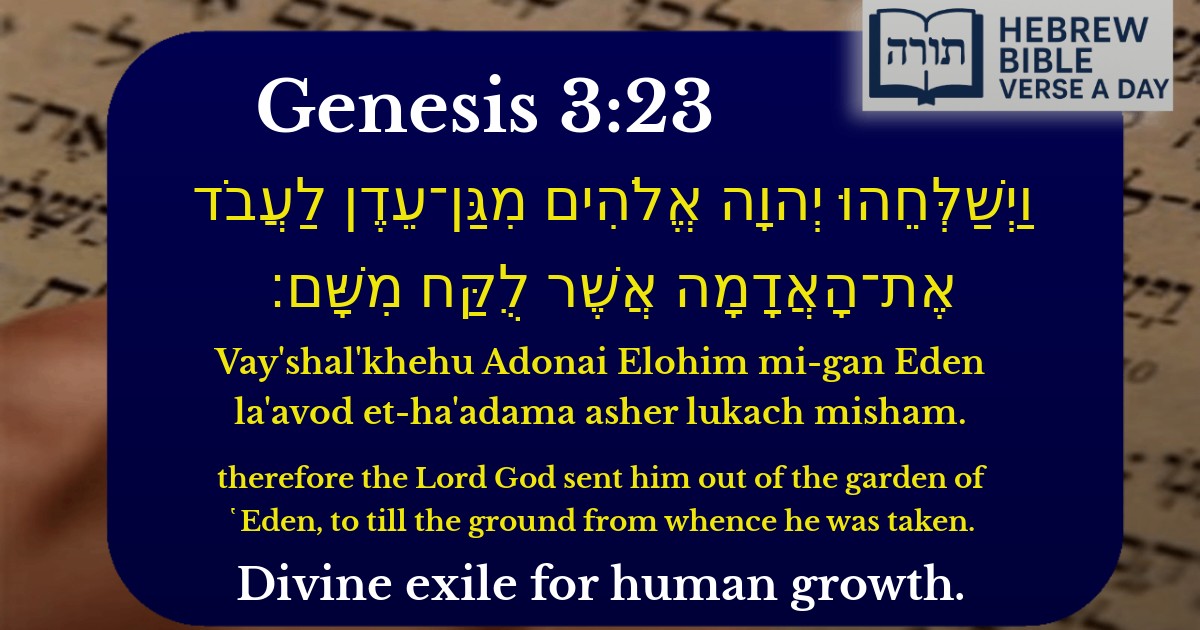Join Our Newsletter To Be Informed When New Videos Are Posted
Join the thousands of fellow Studends who rely on our videos to learn how to read the bible in Hebrew for free!
Hebrew Text
וַיְשַׁלְּחֵהוּ יְהוָה אֱלֹהִים מִגַּן־עֵדֶן לַעֲבֹד אֶת־הָאֲדָמָה אֲשֶׁר לֻקַּח מִשָּׁם׃
English Translation
therefore the Lord God sent him out of the garden of ῾Eden, to till the ground from whence he was taken.
Transliteration
Vay'shal'khehu Adonai Elohim mi-gan Eden la'avod et-ha'adama asher lukach misham.
Hebrew Leining Text
וַֽיְשַׁלְּחֵ֛הוּ יְהֹוָ֥ה אֱלֹהִ֖ים מִגַּן־עֵ֑דֶן לַֽעֲבֹד֙ אֶת־הָ֣אֲדָמָ֔ה אֲשֶׁ֥ר לֻקַּ֖ח מִשָּֽׁם׃
וַֽיְשַׁלְּחֵ֛הוּ יְהֹוָ֥ה אֱלֹהִ֖ים מִגַּן־עֵ֑דֶן לַֽעֲבֹד֙ אֶת־הָ֣אֲדָמָ֔ה אֲשֶׁ֥ר לֻקַּ֖ח מִשָּֽׁם׃
🎵 Listen to leining
Parasha Commentary
📚 Talmud Citations
This verse is quoted in the Talmud.
📖 Sanhedrin 38b
The verse is referenced in the discussion about Adam's creation and his expulsion from the Garden of Eden, illustrating the consequences of his actions.
📖 Avodah Zarah 5a
Mentioned in the context of discussing human labor and divine punishment, relating to Adam's punishment of having to work the ground.


Exegesis of the Verse
The verse (Bereshit 3:23) describes Hashem's decree to expel Adam from Gan Eden after his transgression with the Eitz HaDa'at (Tree of Knowledge). The expulsion serves both as a consequence and a rectification for Adam's actions.
Rashi's Commentary
Rashi explains that the phrase "לַעֲבֹד אֶת־הָאֲדָמָה" ("to till the ground") indicates that Adam was now required to engage in physical labor, a consequence of his sin. Before the sin, his work in Gan Eden was effortless, but now he must toil to sustain himself (Rashi on Bereshit 3:23).
Rambam's Perspective
Rambam (Moreh Nevuchim 1:2) interprets Adam's expulsion as a transition from a purely intellectual existence (focused on divine truths) to a physical one, where he must now contend with worldly struggles. This reflects the human condition after the sin—man must strive to regain spiritual clarity through labor and mitzvot.
Midrashic Insights
Kabbalistic Interpretation (Arizal)
The Arizal (Etz Chaim, Shaar HaKlalim) explains that Adam's labor in tilling the earth symbolizes the spiritual work of refining the physical world (Tikkun Olam). His expulsion set in motion humanity's mission to elevate creation through Torah and mitzvot.
Halachic Implications (Rambam, Hilchot Teshuva)
Rambam (Hilchot Teshuva 5:1) derives from this episode that teshuvah is always possible—just as Adam could repent after his sin, so too can all individuals return to Hashem through sincere repentance.